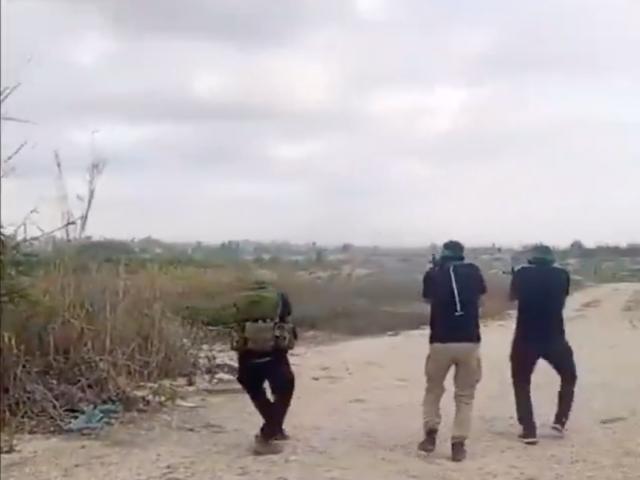Walking across pro-Hamas campuses in North America, activists boldly claim that Hamas is absent in Judea and Samaria. However, Hamas' own videos tell a different story, boasting of attacks on Israeli communities from Palestinian cities in Samaria, widely known as the West Bank.
In a recent incident, Hamas terrorists launched an attack on the Jewish community of Bat Hefer in the Sharon region, as confirmed by the IDF on Wednesday. "A short time ago, terrorists fired from the Tulkarm area towards Bat Hefer," reported the IDF, highlighting a significant escalation. IDF forces swiftly responded, scanning the area for further threats. Although no additional security risks were identified, the hunt for the perpetrators is ongoing.
This morning, 6:47 AM.
— Yaari Cohen (@YaariCohen) May 29, 2024
Hamas terrorists fire a massive barrage of gunfire on a school in Bat Hefer in central Israel, from a nearby Arab village "Tulkarm"
And before all you Hamas supporters start denying it, Hamas proudly published a video of them firing at the school.
>>>>> pic.twitter.com/2fMTc6GHtg
Reports from Bat Hefer reveal no injuries but confirmed damage to property. This marks the second attack on Bat Hefer in just two days. On Tuesday, terrorists from Tulkarm carried out a similar assault, showcasing footage of their actions.
Galit Shaul, head of the Emek Hefer Regional Council, has urgently called for increased security. "Our residents live in escalating anxiety, facing new threats daily," Shaul stated. "We've been warning about the rising tensions for weeks, yet the situation continues to worsen. The IDF and the State of Israel must act decisively and swiftly. It's unacceptable for Palestinians to cross the fence and shoot at our settlements repeatedly in broad daylight."
Shaul further emphasized the need for immediate measures, including a permanent IDF and security guard presence and the establishment of a buffer zone to prevent further incursions. "We must act now before it's too late," she insisted.
🚩
— Voice from the East (@easternvoices) May 29, 2024
In the full video, you can see the Hamas terrorists in TulKarem shooting at the Israeli village Bat Hefer,
(caption in video: ‘Shooting at Bat Hefer 06:30’)
The guy says he speaks on behalf of Al-Qassam Brigades, the military wing of Hamas: "We acted against Zion for Gaza." https://t.co/G4RGR4jRYC pic.twitter.com/2xw8UG4oII
MK Gideon Sa'ar echoed this urgency on his X account: "The shooting from Tulkarm towards Bat Hefer is intolerable and demands an immediate and effective response."
In a broader context, three weeks ago, Israeli forces, responding to the killing of an Army reservist and the wounding of a police officer last November, launched a raid near Tulkarm, resulting in the deaths of five Palestinians, including four Hamas militants. The overnight operation in Deir al-Ghusun village was a direct response to Hamas' escalating violence in the region.
Hamas confirmed the deaths of four al-Qassam fighters, while the Palestinian Health Ministry noted that the fifth body was too disfigured for immediate identification. The Israeli military affirmed the operation targeted a Hamas cell responsible for multiple attacks, and an Israeli special police unit officer was wounded during the raid.
In a shootout near Tulkarem, Yamam counterterrorism officers and IDF forces eliminated 5 terrorists who were involved in the murder of Elhahan Klein last November. Another terrorist turned himself in to the forces.
— Israel National News - Arutz Sheva (@ArutzSheva_En) May 4, 2024
A Yamam officer was critically injured in the shootout. pic.twitter.com/Ow2ci2Xe1a
This clash is part of a series of intensifying confrontations in the West Bank, which have seen a significant increase since Hamas' major attack on Israel last October. Hamas has been strategically expanding its militant network in the West Bank, mirroring its aggressive tactics in Gaza.
The 12-hour raid, which involved the demolition of a two-storey house, underscores the heightened state of conflict. According to Palestinian Health Ministry records, nearly 500 Palestinians have been killed by Israeli forces or Jewish settlers in the West Bank and East Jerusalem since October 7, with casualties including armed fighters, stone-throwing youths, and civilians.
The Palestinians' aspirations for an independent state encompassing the West Bank and Gaza, with East Jerusalem as its capital, remain unfulfilled. Despite U.S.-backed efforts, peace talks have been stalled for over a decade. The recent Gaza war has intensified calls for a two-state solution, although the Palestinian Authority has repeatedly rebuffed such efforts since signing the Oslo Accords in 1993.
Hamas just executed two Palestinians in the city of Tulkarem in the West Bank in accusation of collaborating with Israel.
— Jonathan Elkhoury- جوناثان الخوري (@Jonathan_Elk) November 24, 2023
They hung their bodies on an electricity pole for everyone to see and all gathered to picture it.
Hamas is responsible for killing thousands of Palestinians. pic.twitter.com/Jn2bnpirxf
As the situation continues to deteriorate, the call for immediate and decisive action grows louder. The presence of Hamas in Judea and Samaria is no longer a distant threat but a present and escalating danger that demands an urgent and robust response from Israel and the international community.


